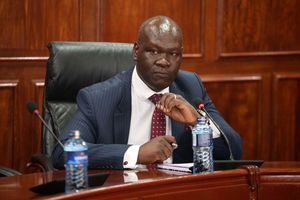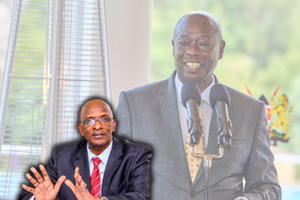Blockchain technology to boost power access in rural areas

What you need to know:
- The new smart-grid solar technology is being piloted in the village by Hivos East Africa.
- The micro-grid is backed by blockchain technology which keeps all the data on power distribution and purchase.
- Details of all the locals using the system are fed and secured using blockchain technology.
- The seller can then check the amount of electricity he sold or the amount of money he has made in a month.
For rural communities across the country where electricity is either non-existent or costly and intermittent, off-grid solar technology is the answer.
The solar panels, which are normally installed on roof-tops to serve a household's electricity needs, are usually connected to small car batteries – the system lights up bulbs besides powering a few electronic gadgets.
But in Singiraine village in Kajiado, not all off-grid power users will need to install solar panels to access electricity. Instead, they will simply need to tap the energy from their neighbours who have already installed the photovoltaic panels at a small fee.
SMART-GRID SOLAR TECHNOLOGY
Through the new smart-grid solar technology that is being piloted in the village by Hivos East Africa, an environmental and renewable energy NGO, and Bithub, a local tech company, a resident with a solar panel can generate and sell their surplus energy to a neighbour.
The micro-grid is backed by blockchain technology which keeps all the data on power distribution and purchase.
Wangari Muchiri, a renewable energy engineer at Hivos East Africa, notes that a lot of solar power generated electricity in households goes to waste yet cannot only be distributed to others, but can also be a source of income to the generators.
While blockchain technology has been widely used in the past in cryptocurrency, it is also coming in handy in other sectors that require big data management and data security.
SELLERS AND BUYERS REGISTERED
“In solar energy blockchain system, energy produced by smallholders are connected into a micro-grid, which is later connected into homes. All sellers and buyers of the energy are registered into the system. The mini-grid is also connected to computers which monitor the sales and operations,” Ms Muchiri explains.
Under this system, the details of all the locals using the system are fed and secured using blockchain technology, hence cannot be hacked or altered.
When an individual sells a certain amount of power to the micro-grid, the data is automatically entered in the computers.
The seller can then check the amount of electricity he sold or the amount of money he has made in a month by dialling a short code on his phone. Power consumers on the mini-grid can also monitor their power consumption.
“The trading of electricity will enable users to access clean energy without a large capital cost, this is going to revolutionise power access across rural communities. Blockchain technology allows this to be done automatically, negating the need for a utility and keeping the prices low,” explains Ms Muchiri, adding that the technology will be replicated in other parts of the country once the Kajiado pilot is complete.
OFF-GRID AREAS
Benjamin Arunda, author, Understanding the Blockchain, a book that demystifies the technology, Kenya’s energy sector has been dominated by a few players who lack the capacity to supply power to off-grid areas, a factor that has kept the cost of electricity high.
“With tokenisation of solar power on a blockchain system, rural dwellers who have solar panels on their rooftops can generate power and sell the surplus to their neighbours in tokens. This would boost supply of electricity, thereby making it more affordable,” says Mr Arunda.
He explains that a proper decentralised power system for Kenya would run on a smart grid connected to power sources, but a model for a smart city would be the best option for sufficient proof-of-concept testing.
“If it works well, for instance, at Konza Techno City, that model can be transferred to rural areas where 70 percent of Kenyans live - the Masdar City in Abu Dhabi where people generate energy by walking on floors is a perfect example,” he says.
HURDLES
But several hurdles stand in the path of Kenya’s ambition to develop the first blockchain power system in Sub-Saharan Africa, which records the longest hours of exposure to sunlight on the planet, with only 600 million people out of 1.5 billion citizens having access to electricity.
“It is quite a journey to prepare for the future of electricity. Blockchain solar power companies will need acceptance and government goodwill to implement their projects. Proper infrastructure must also be in place,” Mr Arunda notes.
The chairman of the Blockchain and Artificial Intelligence Taskforce, Prof Bitange Ndemo, observes that while such a project would create jobs in remote areas, those running it might have a tendency to abuse the system.
“We need to create ethics around the implementation of blockchain projects. Blockchain’s features of immutability and transparency must be safeguarded,” he said.
CONSUMPTION PATTERNS
He expounds that data from the electricity blockchain system can be aggregated and anonymised to generate consumption patterns that inform decisions concerning more access to power in rural areas.
“If we take this project seriously, we could be the first country in Africa to finally crack the ‘power for all’ juggernaut that has held the continent back,” observes Prof Ndemo.
He warns against working in isolation, advising that for Internet of Electricity (IoE), where all processes that are run by electric current will be controlled via a robust blockchain platform to record significant success, solar power on blockchain systems must be followed by distributed manufacturing, where every company cuts costs on site.
“Eventually, everything will depend on each other in the case of a global IoE. Solutions around health, education, agriculture, industrialisation and others need to be connected to the smart grid. This will allow for a uniform take-off of the Fourth Industrial Revolution in Kenya without side-lining any sector,” he explains.
DIGITAL IDENTITY
In a blockchain-based power market, every entity generating electricity receives a digital identity that links to the entire production power. Contrary to the current situation where the Energy and Petroleum Regulatory Authority centrally manages the regulation of energy, the system would be decentralised, minimising unwarranted electricity price fluctuations, corruption and mismanagement by cartels.
Against the backdrop of massive power access gaps especially in Africa, blockchain technology has been identified as the most potential solution to unlock rural economies by coming up with models that enable the sharing of electricity through a blockchain.
Yiftah Ron-Tal, chairperson of the Israel Electric Corporation board, says the future of the energy sector lies within decentralised smart power networks for efficiency and better cybersecurity.
SELL SURPLUS POWER
Predicting that 80 per cent of power consumption and retailing will be on a blockchain by 2040, he underscores that any surface exposed to the sun will be able to generate energy.
“Through a decentralised system, every family will generate power for its needs and sell the surplus in digital tokens to the electric corporation. They will be power consumers, producers and retailers. Every home will own the grid system,” he remarked.
He paints the picture of a future of energy where a multidimensional and sectoral power system will connect all devices, and terms it the Internet of Electricity.
“Through an international peer-to-peer blockchain platform, every power consumer will be connected and payments will be made as tokens of the Wattcoin cryptocurrency to give affordable power to one billion humans who live without power in all five continents,” he concluded.






